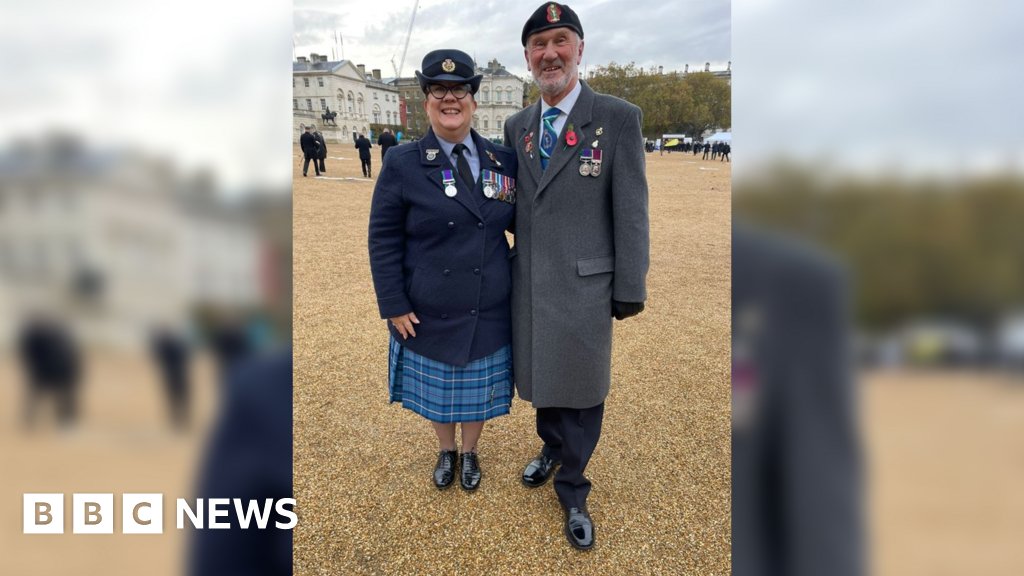
Mel Watson, a veteran from Hornsea, will proudly represent East and North Yorkshire as a standard bearer at the Royal British Legion's Festival of Remembrance, taking place at the Royal Albert Hall in London on Saturday. Watson, who served in the British Army from 1960 until 1986, expressed his pride in representing his region during this significant event. His daughter, Tracy Watson, a veteran of 30 years with the RAF, will be supporting him during the festival. The event features performances scheduled for 14:00 and 19:00 GMT, followed by the Remembrance Sunday parade, which includes a wreath-laying ceremony by members of the Royal Family. Watson emphasized the importance of remembering all conflicts, stating, "I think it's very important that we do remember all this and hopefully we don't have to experience it again."
In addition to Watson's participation, communities across the UK, including Watford, Wick, the Algarve, and Kent, are coming together to honor the sacrifices made by soldiers in various conflicts. In Watford, Remembrance Day events feature a two-minute silence, readings by local officials, and a parade for residents to participate. The town has also installed silhouette figures of World War I soldiers as part of an art installation called 'There But Not There', alongside a statue titled 'Unknown Women at War' to recognize the contributions of women in wartime. The mayor of Watford emphasized the importance of remembering those who served during the two world wars and subsequent conflicts, inviting residents to join the Remembrance Service on November 12 to pay their respects.
In Wick, Scotland, a bronze statue symbolizing Victory and Peace is celebrating its 100th anniversary, having been unveiled on October 31, 1923. This statue has become a focal point for the town's annual remembrance events and underwent restoration in 2018, serving as a poignant reminder of the sacrifices made in both world wars.
In the Algarve region of Portugal, Armistice Day is commemorated on November 11 each year. The Royal British Legion Portugal Branch holds a service at St. Luke's Church, followed by a wreath-laying ceremony and a two-minute silence. The event is attended by notable figures such as Simona Demuro, the British Consul for Portugal and Cabo Verde, and Clive Jewell, the British Vice Consul based in Portimão. Another service occurs in the West of the Algarve at St. Vincent’s Chaplaincy. The day serves to remember those who lost their lives in war and to raise funds for veterans in need, with approximately 158 boxes of poppies distributed across the region.
In Kent, communities are preparing for their own Remembrance Sunday events, featuring annual parades and church services. The New Folkestone Society will host a Son et Lumière Remembrance Parade on Saturday from 18:00 to 20:00 GMT. On Sunday, a service at Canterbury Cathedral is scheduled for 10:25, followed by a wreath-laying ceremony and a parade with military groups at noon. Dover will also hold a parade from Biggin Street to Maison Dieu House, with the mayor leading a memorial service at St Mary’s Church. Additionally, a fundraising concert featuring the Shorncliffe Military Wives Choir will take place in Folkestone, and a Service of Remembrance in Royal Tunbridge Wells is set for 10:45, including a March Past.
King Charles III recently led a national memorial service in the UK to honor those who died serving the country, amidst heightened security due to tensions surrounding the Israel-Hamas war. The Metropolitan Police Service deployed extra officers to ensure the safety of the event and protect the national war memorial, the Cenotaph. Prime Minister Rishi Sunak laid a wreath on behalf of the nation, emphasizing the importance of remembering sacrifices made by those who defended the country. The service was attended by King Charles III, other members of the royal family, thousands of veterans, and serving military members.
The Muslim Council of Britain (MCB) also participated in a multi-faith Remembrance Service at City Hall, honoring those who lost their lives in war and conflict, including 2.5 million Muslims. Zara Mohammed, the Secretary General of MCB, read a translation of verses from Surah Ad Duha and offered a prayer for peace, attended by various civil leaders and notable figures.
In a significant recognition of service, two veterans, Mike Rossiter and Ernest Robb, received the first military medals issued by King Charles III for their roles in historic nuclear testing operations. The ceremony highlighted the long-debated health impacts of nuclear testing, with discussions reignited regarding the ethical implications of such operations. Rossiter and Robb both witnessed the UK's nuclear testing efforts, with many veterans and local populations reporting health issues they attribute to these tests. The UK Ministry of Defence maintains that there is no conclusive evidence linking radiation exposure to negative health outcomes.
As communities across the UK and beyond gather to remember and honor those who served, the collective efforts reflect a deep commitment to acknowledging the sacrifices made in the name of peace and freedom.